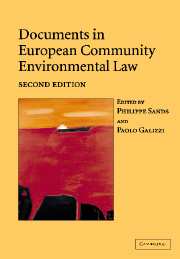Book contents
- Frontmatter
- Contents
- Preface
- PART I General principles of EC environmental law
- PART II European Community institutions and legislation
- PART III The relationship between environmental protection, financial assistance and free trade
- PART IV Procedural techniques of environmental protection
- PART V Protection of air quality
- PART VI Biodiversity and nature conservation
- PART VII Waste
- 33 Council Directive 75/442/EEC of 15 July 1975 on waste (OJ L 194 25.07.1975 p. 39)
- 34 Council Directive 91/689/EEC of 12 December 1991 on hazardous waste (OJ L 377 31.12.1991 p. 20)
- 35 Council Regulation (EEC) No 259/93 of 1 February 1993 on the supervision and control of shipments of waste within, into and out of the European Community (OJ L 030 06.02.1993 p. 1)
- 36 Council Directive 1999/31/EC of 26 April 1999 on the landfill of waste (OJ L 182 16.07.1999 p. 1)
- 37 Directive 2000/53/EC of the European Parliament and of the Council of 18 September 2000 on end-of-life vehicles (OJ L 269 21.10.2000 p. 34)
- 38 Directive 2000/76/EC of the European Parliament and of the Council of 4 December 2000 on the incineration of waste (OJ L 332 28.12.2000 p. 91)
- PART VIII Dangerous substances
- PART IX Water quality
35 - Council Regulation (EEC) No 259/93 of 1 February 1993 on the supervision and control of shipments of waste within, into and out of the European Community (OJ L 030 06.02.1993 p. 1)
from PART VII - Waste
Published online by Cambridge University Press: 06 January 2010
- Frontmatter
- Contents
- Preface
- PART I General principles of EC environmental law
- PART II European Community institutions and legislation
- PART III The relationship between environmental protection, financial assistance and free trade
- PART IV Procedural techniques of environmental protection
- PART V Protection of air quality
- PART VI Biodiversity and nature conservation
- PART VII Waste
- 33 Council Directive 75/442/EEC of 15 July 1975 on waste (OJ L 194 25.07.1975 p. 39)
- 34 Council Directive 91/689/EEC of 12 December 1991 on hazardous waste (OJ L 377 31.12.1991 p. 20)
- 35 Council Regulation (EEC) No 259/93 of 1 February 1993 on the supervision and control of shipments of waste within, into and out of the European Community (OJ L 030 06.02.1993 p. 1)
- 36 Council Directive 1999/31/EC of 26 April 1999 on the landfill of waste (OJ L 182 16.07.1999 p. 1)
- 37 Directive 2000/53/EC of the European Parliament and of the Council of 18 September 2000 on end-of-life vehicles (OJ L 269 21.10.2000 p. 34)
- 38 Directive 2000/76/EC of the European Parliament and of the Council of 4 December 2000 on the incineration of waste (OJ L 332 28.12.2000 p. 91)
- PART VIII Dangerous substances
- PART IX Water quality
Summary
Editorial note
Regulation 259/93 regulates and prohibits shipments of all waste within, into and out of the Community, except for five categories of waste which are excluded from the application of the Regulation and certain wastes destined for recovery only and listed in Annex II (Article 1). The Regulation establishes rules to govern four situations: (1) shipments of waste between Member States; (2) the movement of wastes between Member States; (3) exports of wastes; and (4) imports of wastes. Additional rules govern transit.
The Regulation allows waste to be moved between Member States for disposal, subject to the rules governing prior notification and authorisation by national authorities (Articles 3–5) and the three general grounds on which a consignment may be stopped (Article 4(3)(a)–(c)). The shipment of waste for recovery listed in Annex III (amber waste) is subject to a system of prior notification and authorisation (Articles 6–8). Consignments of waste for recovery listed in Annex IV (red list) are generally subject to the same procedures as for the amber list (Article 10). The Regulation also provides for certain information requirements in the case of movement between Member States and via non-Member States (Articles 11–12).
The provisions on shipment between Member States (Title II), on common provisions (Title VII) and on other provisions (Title VIII) do not apply to shipments within a Member State, although Member States may decide, and are free, to apply these provisions (Article 13(1) and (4)).
- Type
- Chapter
- Information
- Documents in European Community Environmental Law , pp. 638 - 671Publisher: Cambridge University PressPrint publication year: 2006
- 2
- Cited by



